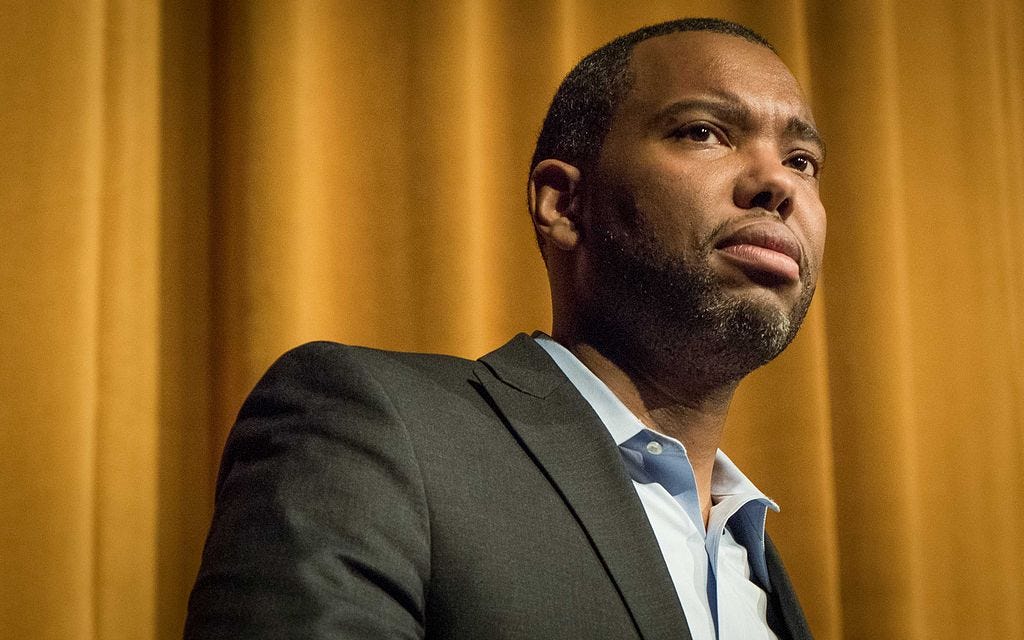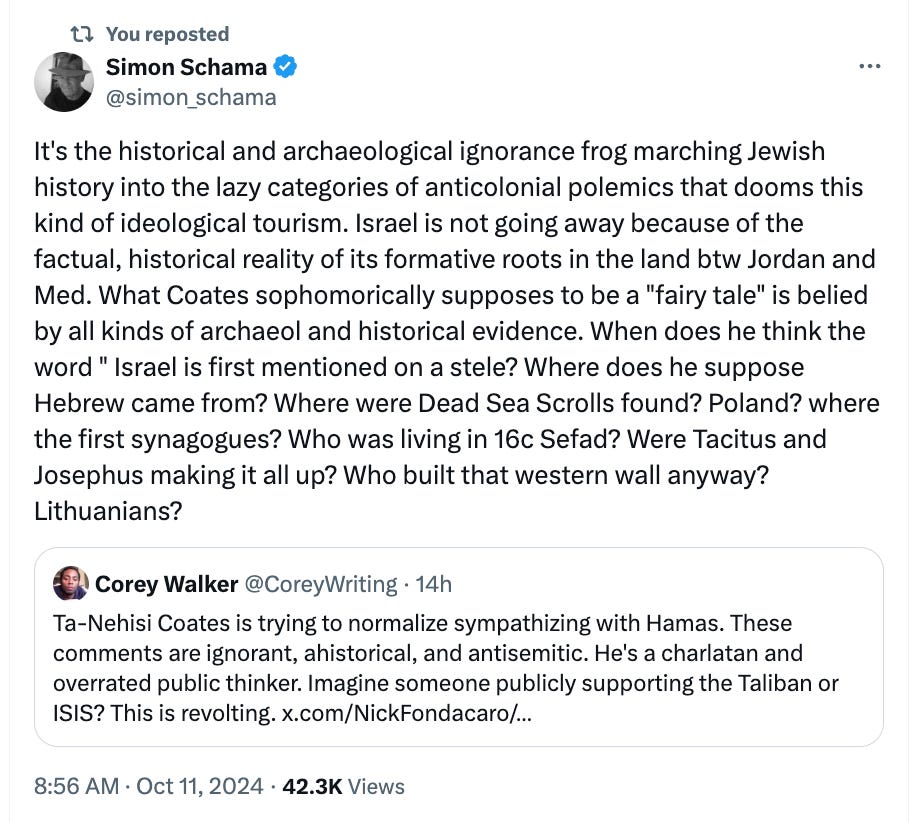Ta-Nehisi Coates & the Politics of Bias
Selective storytelling isn’t a bug in Coates’ writing – it’s a feature.

CBS News is boiling in controversy this week after author Ta-Nehisi Coates—who made his name, fame and fortune calling for reparations for black Americans— sawt down for an interview with CBS News. Problem was, the interviewer, Tony Dokoupil, dared to push back on some of the more extravagant claims Coates makes in his new book on the Israel-Arab conflict.
This line of questioning, which we once called “journalism,” was deemed inappropriate by CBS brass, who subjected Dokoupil to a struggle session with the network’s “Race and Culture Unit” (yes, that’s a real thing), intervention by a DEI specialist (of course), and a verbal pounding by executives that left Dokoupil distraught.
It’s weird that we’re all now talking about Coates, who, in many ways, ignited the media’s passion for race politics in the early 2010s. Coates disappeared for a good few years to cash in on his literary stardom by writing “Back Panther” graphic novels for Marvel. Cha-f’ing-ching. But he re-emerged, right on time for the conflict of a generation, by penning a book on the Mideast, an immensely complex topic he knows nothing about, aside from what was gained on a 10-day trip to the region.
But this is all part and parcel—not just to Coates but to the vapid, self-obsessed well of hypocrisy of the media. Don’t believe me? Well, read on!
The Rise of Ta-Nehisi: Loving…Bill Cosby?
Most people know Coates for his Atlantic cover story advocating for reparations. However, his breakout moment came with a 2008 piece in the Atlantic, “This is How We Lost to the White Man,” that amounts to a 7,000-word hagiography of, yes, post-rape-allegation Bill Cosby. In the piece, Coates positioned Cosby as a symbol of Black independence, moral clarity, and social vision, placing the accused rapist in the pantheon of black historical giants like Malcolm X, Marcus Garvey, and Booker T. Washington.
But Coates didn’t stop there. In an act of supreme chutzpah, he even compared Cosby to Martin Luther King, Jr., attempting to contrast Cosby’s so-called "authentic" stance with MLK’s supposedly "gauzy" dream. Coates wrote:
"Driving Cosby’s tough talk about values and responsibility is a vision starkly different from Martin Luther King’s gauzy, all-inclusive dream: it’s an America of competing powers, and a black America that is no longer content to be the weakest of the lot."
At that point, Coates was not just elevating Cosby; he was rewriting the narrative. He transformed Cosby into a crusader for Black self-empowerment, ignoring the troubling context surrounding Cosby’s past.
The Omission That Speaks Volumes
This piece, which put Coates on the map in literary circles, was published just two years after Philadelphia magazine reported graphic allegations by Andrea Constand that Cosby had drugged and raped her. Other similar allegations had already surfaced: in 2005, Beth Ferrier told the Philadelphia Daily News that Cosby had drugged her, and later in 2006, Philadelphia published Barbara Bowman's account of a similar incident.
Coates and The Atlantic editors either ignored these reports or, worse, chose to overlook them entirely. Instead, in his long essay, Coates described Cosby as a moral evangelist, writing about his speeches to Black audiences and comparing him to Malcolm X. The piece opens with Coates’ description of Cosby’s address in Detroit:
"Last summer, in Detroit’s St. Paul Church of God in Christ, I watched Bill Cosby summon his inner Malcolm X."
For a journalist to miss—or deliberately ignore—such damning accusations is more than an oversight; it’s a pattern. Coates has consistently pushed his vision of "justice" while deleting any layers of context that might challenge his perspective. This same approach is evident in his latest work on Israel-Palestine, where he omits mention of Hamas or Hezbollah, reducing a complex issue into a one-sided polemic.
Coates’ failure to engage with context reveals a troubling trend: his journalistic method revolves around crafting narratives that serve his polemics, regardless of facts. Even as he quoted Cosby preaching self-empowerment to Black men, saying, "Men, if you want to win, we can win," Coates made no mention of the irony and hypocrisy of Cosby’s message given the numerous allegations of sexual assault against him. He quoted Cosby advocating for men to "protect our women and children" while omitting that Cosby’s youngest accuser was only 16 years old when she alleged he had raped her.
This selective storytelling isn’t a bug in Coates’ writing; it’s a feature. His pattern is to erase inconvenient truths in order to push a zero-sum version of justice—one that fits his ideological goals but disregards broader realities.
CBS’s decision to criticize Dokoupil for his questioning of Coates is a prime example of culture capture. As I wrote in my *UnHerd* article, legacy media outlets like CBS have long abandoned their role as objective arbiters. Instead, they have become gatekeepers, shielding cultural icons like Coates from genuine scrutiny. They adopt the interests of those they favor, refusing to challenge the figures they have invested in promoting.
This pattern reflects a larger crisis within legacy media, where ideological alignment takes precedence over journalistic integrity. Coates’ historical illiteracy, noted by historians Simon Sebag Montefiore and Simon Schama, further underscores this issue. Montefiore tweeted that Coates is "historically illiterate," highlighting how Coates’ lack of historical understanding leads to simplistic and misleading narratives. Schama echoed this sentiment, warning of the dangers of historical cherry-picking—a method Coates frequently employs to support his narratives without engaging with complexity.
The symbiotic relationship between Coates and outlets like CBS ultimately weakens both parties. Coates’ work, which sacrifices complexity for ideological purity, fits perfectly within a media landscape that prioritizes narrative over truth. But this relationship is unsustainable. As audiences grow more skeptical of legacy media’s intentions, controversies like this accelerate the decline of trust in these institutions.
CBS’s reluctance to support its own interviewer shows that its commitment is not to journalism but to maintaining its ideological narrative. When even the simplest questions are off-limits, audiences recognize that what’s being presented is not a pursuit of truth but an act of protection.
The Ta-Nehisi Coates controversy is a microcosm of the deeper issues plaguing legacy media today. It’s not just about Coates; it’s about the structures that allow figures like him to rise without scrutiny. For legacy media to regain its credibility, it must abandon its habit of protecting cultural icons and return to fostering genuine debate. Until that happens, both Coates and the media that amplify his voice will continue their decline.
The public’s disillusionment is growing, and the echo chamber built by Coates and the outlets that support him serves only to push audiences further away. If the media continues down this path, it will find itself left with an ever-shrinking base, while the rest of the public looks elsewhere for genuine insight and truth.
Wikipedia and Paid Bias
In addition to exploring the recent controversy surrounding Ta-Nehisi Coates, I recently published a new piece on Pirate Wires titled How Wikipedia is Becoming a Massive Pay-to-Play Scheme. The article investigates how the world’s largest open-source knowledge platform is increasingly being manipulated by PR firms and corporate interests.
As I detail in the piece:
Over the past two decades, as Wikipedia rose to the fourth most visited site online, a boomtown industry feeding an insatiable demand for services like article creation, editing, management and deletion has emerged. While the Wikipedia community, along with the Wikimedia Foundation, work to fight illicit “black hat” editing with undisclosed conflicts of interest, it’s a losing battle, with a seemingly unlimited supply of new front companies springing up to replace editor accounts and companies that get banned from the site.
But the white hat vs. black hat distinction — white-hat editing abides by the site’s regulations, like disclosing paid interests and not making direct edits to articles — sidesteps the real point: given the sheer scale of paid editing on Wikipedia, there’s a reasonable likelihood that any article with even the most remote economic interest will eventually be shaped by the entity that stands to benefit. The question this leaves us asking is whether we can really apply the historic term “encyclopedia” to a sprawling network of thousands of articles carefully pruned by the PR departments of billion dollar companies, or if Wikipedia is something else entirely.
In the piece, I show how everyone from the New York Times to NBC News to Facebook, Axios, Waymo, Jeffrey Katzenberg, the deputy defense secretary, Salesforce and even Breyer’s ice cream engages in the pay-to-play approach to editing their corporate reality.
Here’s the link again: https://www.piratewires.com/p/how-wikipedia-is-becoming-a-massive-pay-to-play-scheme
Till next time – ta!



C oates is an equal opportunity hater of America and Israel
I think what you predict about legacy media has already occurred:
https://news.gallup.com/poll/394817/media-confidence-ratings-record-lows.aspx
The bias across the spectrum, tv, press, web is so obvious the fact that the media themselves don't recognize it is the real tragedy....